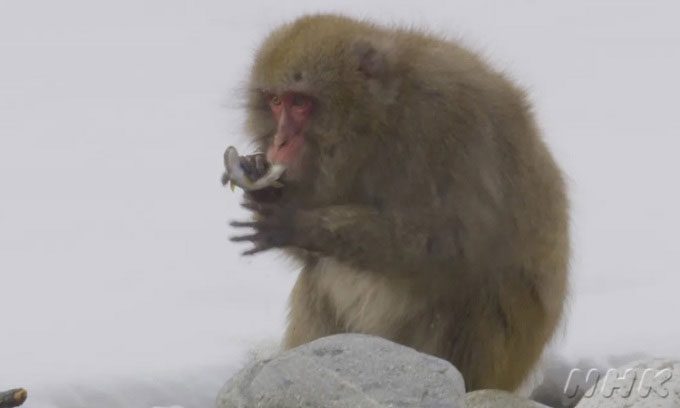Snow monkeys in the Japanese Alps can learn the skill of fishing to find food during harsh winter conditions.
Researchers have directly observed Japanese snow monkeys catching and eating fish from flowing rivers and announced their findings in the journal Scientific Reports, IFL Science reported on January 13. They believe this behavior may have evolved within a troop of monkeys as a survival strategy during the severe winters in the Japanese Alps.

Snow monkeys in the Kamikochi region catching fish from the river. (Photo: NHK)
According to the research team, snow monkeys (Macaca fuscata) in the Kamikochi area of the Japanese Alps experience one of the coldest and harshest environments in winter with scarce food sources. Typically, snow monkeys eat bamboo leaves and various trees during the winter months, although the Kamikochi area has many small streams that maintain a year-round temperature of 6 degrees Celsius and do not freeze in winter.
Speculating that the aquatic organisms in these streams may help the local snow monkey population survive when food is scarce, researchers examined the composition of monkey feces over three consecutive winters. They discovered DNA from brown trout in about 20% of the samples, indicating that snow monkeys may eat fish.
However, the research team is unclear whether the snow monkeys actively catch live fish or only consume dead fish. To find out, they monitored several troops of snow monkeys along the Azusa River from January to March 2022.
“We successfully observed the active behavior of snow monkeys catching and eating fish on 14 occasions, six of which were direct observations and eight involved infrared camera traps. The camera trap data included six additional recordings, although we could not confirm they were definitely fish. Additionally, we also observed several failed hunting attempts when the snow monkeys reacted to the sounds of fish splashing in the water,” said the research team from Shinshu University.
Describing the rudimentary methods used by the monkeys to catch aquatic prey, researchers explained how they chase fish through shallow waters before grasping them tightly with both hands and biting them. While they hope that continued observation may answer further questions, they speculate that this behavior may have evolved as snow monkeys gradually began exploiting food from rivers in winter. According to their hypothesis, snow monkeys likely began foraging for aquatic plants, eventually leading to the consumption of live insects among the vegetation. Over time, the troop actively sought out insects and learned to flip rocks to catch them. Eventually, they developed the skill of fishing.


















































